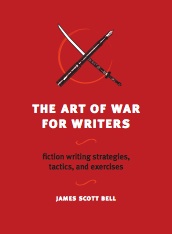 “A voice journal will keep your characters from becoming little versions of you.”
“A voice journal will keep your characters from becoming little versions of you.”
That advice comes from James Scott Bell, author of The Art of War for Writers, a new book of strategies and exercises for fiction authors.
“You’ll find yourself excited about your characters. You’ll think about them even when you’re not writing. They will become real to you.”
Creating nuanced characters
As a developmental editor working with a broad variety of fiction and non-fiction writers, I try to help them flesh out the various elements of an authentic, complex, multi-dimensional character portrait. These include an original voice or vocal style, as well as physical appearance, age, and other unique details that leap off the page.
Nuanced characters are crucial to the success of a book. The reader has to identify with them, care about them, or at least want to know what happens to them.
A voice journal is a tool that can help your characters come alive, wake up and sing, and keep your readers reading. With Bell’s kind permission, here’s how it works, from his book:
Keeping a voice journal
from The Art of War for Writers, by James Scott Bell
The voice journal is my favorite way of getting to know a character.
A voice journal is simply a character speaking in stream-of-consciousness mode. You prompt the character by asking the occasional question, and then just let your fingers records the words on the page.
It’s essential that you do not edit as you write. It’s best to write in five- or ten-minute chunks, without stopping. Over and over again.
Here is what a voice journal might look like with a character I’m making up right now:
My name is Pierpont Feenie, and people stare at me because I’m six foot nine. So what? That’s the body I got, and that’s the body I use. I go down to Venice Beach, and I play basketball, I feel alive. I can jump, I can fly, I am the best there is on the blacktop. They got guys down there, college guys who think they can bang with me, but I’ve got the sky hook, I’ve got the beef, and I love to lay them out. Laying them out keeps me from killing people. See, I used to be an assassin. The tallest assassin in the world.
When I started the voice journal, I did not know that Pierpont was an assassin. But he told me he was. So I wrote it down.
However, if this does not fit the needs of my story, it’s very easy to change that and go on with something else.
Next, you can concentrate on background:
I was born in New Jersey and grew up in the rough part of Newark. My dad died in a subway tunnel. Somebody pushed him off the platform. They never found out who. I was eight years old and my mom didn’t do too well after that. I had to take care of my little sisters. Twins. Two years younger than me. I had to grow up fast. The night our building caught on fire, well, that made me grow up even faster…
Keep going with this. It’s fun, and it makes for better characters in better stories.
Get inspired
We can all learn from the greats. Listen to this passage from one of Elmore Leonard’s best books, Get Shorty. Here’s Chili Palmer the gangster, in Miami, leaving Vesuvio’s after lunch:
Chili went in the checkoom to get his jacket and all that was in there were a couple of raincoats and a leather flight jacket must’ve been from World War Two. When Chili got the manager, an older Italian guy in a black suit, the manager looked around the practically empty checkroom and asked Chili, “You don’t find it? Is not one of these?”
Chili said, “You see a black leather jacket, fingertip length, has lapels like a suitcoat? You don’t, you owe me three seventy-nine.” The manager told him to look at the sign there on the wall. WE CANNOT BE RESPONSIBLE FOR LOST ARTICLES. Chili said to him, “I bet you can if you try. I didn’t come down to sunny Florida to freeze my ass. You follow me? You get the coat back or you give me the three seventy-nine my wife paid for it at Alexander’s.”
Good, isn’t it. Elmore Leonard is a master.
What about you?
 Who are some of your favorite characters? What makes them pop for you?
Who are some of your favorite characters? What makes them pop for you?
Try a voice journal yourself and let me know how it goes.
The rest of Bell’s book has other useful tips and ideas for writers, whether you’re working on fiction or non-fiction.
You can get more details at his website.
i found this site helpful. im thinking of starting my own character journal and seeing where it goes. Maybe my character will surprise me! Who knows.
As several of you note, this seems like an acting exercise. Maybe that’s because I was an actor for several years, mostly in New York. I did a lot of improv, too. It helps to get you out of the purely objective mode and gets your imagination running.
This is a wonderful idea. I’m embarking on writing my first children’s early chapter book and I know this will help me develop authentic characters. The idea of making characters “little versions of you” is hard to avoid if you don’t flush out all the facets of each character.
This is a lot of fun. I have experimented with just this approach on a blog. Every entry is a different voice. And you are right: sometimes I sound like mini-me’s and sometimes I nail it. I also tend to make the dialogue less self-conscious and more in-the-moment than this example. I think I like your “who I am” approach better. If you have a minute, take a look and help me improve. http://oh-thereyouare.blogspot.com/
Yes, this does sound like a drama exercise. I remember doing “hotseating” in drama classes, where one person would go in the middle and, in character, answer questions from the rest of the class.
Blending free-association writing with this kind of technique is a great idea, and sure to bear fruit. There will almost always be something you can use, and the rest can be thrown away, or perhaps saved for another character.
Speaking of Elmore Leonard, here’s a link to his ten rules for writing, plus a load of rules from other authors:
http://www.getmewriting.com/techniques-and-tips/guardian-posts-writerly-advice/
I think this is a great tip. I loved the Twilight books but I believe Bella IS Stephenie Meyer… Edward’s character has a tremendous voice, but I think she could have done better with Bella.
Now, Nora Roberts is a voice master… I’ve read many of her romances and recently finished a trilogy set in Ireland. The way Roberts weaves the Irish lilt into her dialogue is pure genius.
This is really good. I’ve been so bad about blogging on my book, that I may use this as a blog post idea. Plus I will get to know my characters better. Thanks.
I’ve been doing something similar for a while now and I love it.
its very much like an acting exercise but useful all the same
Great advice! I was stuck earlier today on a key part of my WiP, and started writing in a character’s voice. It just kept talking and talking, and was tremendously helpful. I never thought of trying this with all the characters, however. I will later today!
I’ve found that some of the material I end up cutting from one scene or another originally served to help me figure out what each of the characters sound like. Dialogue will go on for pages, almost all of it to be chucked later on. Now I realize what I was doing, and why I shouldn’t feel bad for laying out all of that voice exploration, I just need to find a better place to do it.
I’m reading “Art of War for Writers”, but haven’t gotten to this nugget yet.
Great advice! You often see characters becoming too much like the author.
I started doing voice journals back when I was an actor. Improvisation, exercises. When I began writing it was a natural continuation. The trick to it is not to get hung up on everything making sense, e.g. regarding background and biography. Just go. You want the sound first and foremost. Nuggets you can use for backstory will naturally occur. That’s a bonus.
James Frey suggested a very similar thing in “How to write a damn good novel.” He suggests an autobiography in the character’s voice. He has some other good tips as well, that I blogged about a while ago.
Great suggestion! Thanks! I will work on a voice journal after reading this.
What I have been doing is keeping story journals on each character, learning their backgrounds and motivations and ticks. Through these exercises, a wealth of information comes forward, not all necessary to the novel, but that enriches the characters. I have been especially astounded at how it enriches the supporting characters.